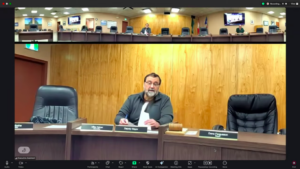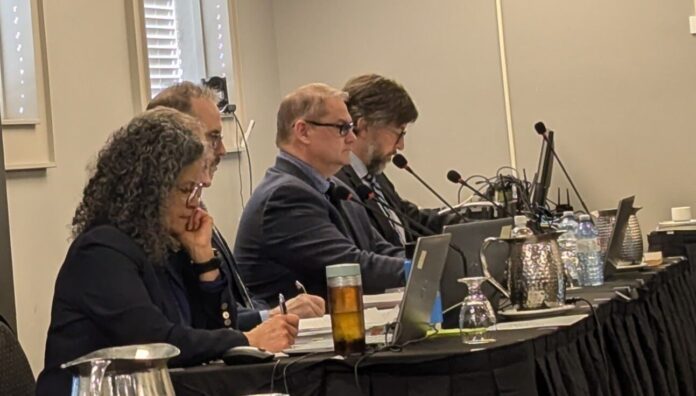A hydro rate increase may or may not be in the cards for N.W.T. , but the public will have to wait until May 13 or later to hear a decision. And NWT Power Corporation’s new hybrid board will have the final say. That’s what the company’s CEO Paul Grant told NWT’s Public Utility Board panel at public hearings this week in Yellowknife.
The Northwest Territories Public Utilities Board held a hearing to discuss the 2024 to 2025 general rate application the company submitted.
NWT’s Power Corporation is applying to increase the cost of electricity for all its customers by 15 per cent. The company says that increased operational costs, inflation and capital investment give them no choice but to do so.
One reason for the increased costs has to do with the Talston station overhaul. NWT Power Corp said the total cost for the overhaul is expected to total approximately $97.8 million. This includes $70 million in project costs and about $45 million in fuel and other operational costs
A major source of the increased costs included the forest fire in 2023 that damaged the plant, the loss of fuel during the fire and insurance costs along with inflation, and staffing costs.
Contractor costs alone, which included project management, site supervision and maintenance tallied over $7 million dollars.
The Talston station is the source of primary power for Fort Smith, Fort Resolution, Hay River, Enterprise and K’atl’odeeche First Nation.
The hearing was held in person at the Chateau Nova Hotel in Yellowknife and over Zoom on April 7 and 8. A YouTube live stream of the hearing was posted on the energy board’s website
Northwest Territories Public Utilities Board Chairman Gordon Van Tighem, Vice-Chairman Tina Gargan, Member Myra Berrub, Member Danny Yakeleya and Member Joe Auge heard testimony and evidence from leaders and stakeholders across N.W.T. Raj Retnanadan led cross-examination for the Public Utilities Board
Leading the Northwest Territories Power Corporation’s panel were CEO Paul Grant and Counsel K.C. Karen Salmon.
Intervenor panels representing Naka Power Utilities and the hydro communities of the city of Yellowknife, the towns of Hay River, Fort Smith and Inuvik presented arguments and evidence against the proposed rate increase.
On day one of the hearings, Paul Grant, the power corporation’s chief financial officer, said the company has explored rate mitigation options.
“Working with the Government and GNWT, NTPC has secured up to $12 million per year in government funding for four years. This allows NTPC to propose not a 24.8 percent increase but a rate increase of 15 percent across all classes of customers minimizing shock,” he said.
Grant explained that the company also proposes a “stepped inclusion” of the Taltson Overhaul costs, which would defer ongoing commissioning costs.
“NTPC has put forth a GRA application based on reasonable and realistic load, cost, and revenue forecasts. Approval of the requested revenue requirement will allow NTPC to continue to provide safe and reliable service to the Northwest Territories,” he said.
The decision to approve or deny a hydro rate increase now sits with the NWT’s Public Utilities Board. Whether it’s enacted or not will depend on the decision of new hybrid board said Grant.
Grant said that ultimately the new board will make the call for whether the rate should be increased.
A new board structure is in the works at the company, which could influence future leadership decisions including cost management.

Fort Smith Deputy Mayor Mike Keizer spoke against the proposed rate increase during the public consultation session on April 7.
“The greatly-inflated costs of the Taltson hydro upgrade will also inflate our utility rates,” said Keizer
Keizer said the expansion of the Halston station is being geared for commercial use and residents should not bear the burden of that cost in their utility bills.
Deputy Mayor Keizer said the hydro communities and its members “want the same things.”
Keizer accused the NTW’s power corporation of failing to deliver secure, sustainable and affordable electricity.
“We are concerned that NTPC and its current operating format is unable to provide the efficiency, foresight, and leadership needed to accomplish these goals,” he said.
Keizer said that the community of Fort Smith feels that any costs to be considered should only be submitted once the project is completed. He said the costs related to the Taltson Hydro upgrade should therefore not be considered in this GRA process.
Over the summer the power corporation plans to take the plant offline again briefly to install the permanent solution. Keizer argued that the company’s current “interim solution” implies the project still has deficiencies and is not complete.
The second day of the public hearing continued Wednesday with discussions around project management strategies including decision-making to assess risks and strategies to mitigate costs.
Discussions at the hearing explored whether the electricity costs charged to resident customers met the ‘no harm standard’ set by regulatory standards.
The ‘no harm’ standard assures no harm is incurred by any group of customers or the general public.
Representatives from NWT Power Corp said a system of classification stages was used to help steer project planning.
Hydro community representatives questioned the practicality of the system in place, citing the ongoing and mounting costs for projects like the Talston overhaul. To date, the cost of the Talston overhaul project went $23 million over the original estimate.
Representatives from NWT’s Power Corp said the complexity of projects influenced the lengthy waits and extensive resources needed. They said the complexity of projects like Talston made it difficult for the Power Corp to get accurate estimates.
Naka and the NWT Power Corporation demonstrated differing views on issues around service provision and cost recovery strategies.
Naka criticized NWT Power for not considering practical solutions to the question of rate increase. Naka said that they had proposed practical solutions to improve efficiency and the cost of electricity. NAKA commented that they have not seen proposals for similar practical solutions from NWT Power Corporation on its own application.
NWT Public Utilities Board Chairman Gordon Van Tighem asked the panels to submit their arguments in writing by April 29 and the reply arguments by May 13. The hearing has been adjourned until the board comes to a decision on May 13 or later.





